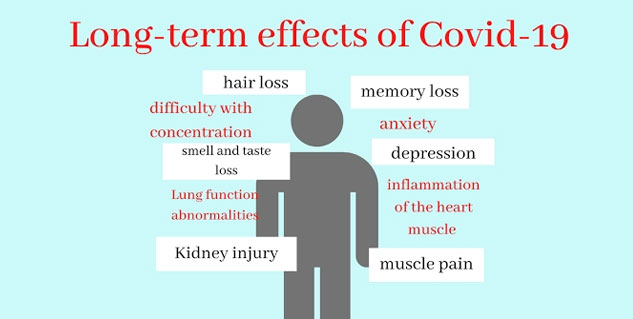

The nature and extent of symptoms can vary greatly from one person to another.

While there’s still much we don’t know about long COVID, there are steps you can take to ease your symptoms, regain your health, and support your mood. Whether your symptoms are directly linked to the virus, a post-viral syndrome, or the effects of the pandemic, it doesn’t mean that your suffering is any less real or that you’re powerless to improve how you feel. Similarly, it’s common for long-term health effects such as fatigue, anxiety, and PTSD to follow treatment for any life-threatening illness, especially if it involves hospitalization (in the case of COVID-19, hospitalization coupled with isolation from family and loved ones). The length of the pandemic, its escalating death toll, and all the associated lockdowns, quarantines, and financial hardships have taken a huge toll on our collective mental health, with skyrocketing rates of anxiety, depression, and other emotional problems-all of which can trigger physical symptoms as well. After all, how many of us haven’t experienced anxiety, a depressed mood, or had trouble sleeping or concentrating at some point during this difficult time? Many long COVID symptoms are hard to quantify and some may be due to the trauma of the pandemic with all its stress, grief, isolation, and upheaval, rather than the virus itself. If you’ve had and recovered from COVID-19, though, try not to let the numbers alarm you. Perhaps the most startling research has suggested that up to one third of COVID-19 survivors are likely to suffer neurological or mental health problems within six months, ranging from mood disorders to dementia or stroke. Even those who weren’t hospitalized and only experienced mild coronavirus symptoms may still experience long COVID. How common is long COVID?ĭifferent studies have varied wildly in their results, estimating that anywhere from 10% to 60% or more of COVID-19 patients may be affected by lingering symptoms such as fatigue, sleep problems, and mood changes. Of course, because it’s such a new virus, much remains unclear about the lasting effects of COVID-19, including why some people are affected by long COVID, what exactly causes the symptoms, or how long they’re likely to last. As a “long hauler”, you may also suffer changes in your mood, most commonly exhibiting symptoms of anxiety, depression, or post-traumatic stress disorder (PTSD). Some people with long COVID feel like their head is clouded or in a fog, making it difficult to do math calculations, for example, or find the right word to say. You may be unusually forgetful, find it difficult to concentrate on simple tasks, or feel like you’re unable to think straight. Even light physical activities, such as housework, driving, or making a phone call can leave you feeling exhausted and aching. Otherwise known as post-COVID-19 syndrome, long-tail COVID, or long-haul COVID, the effects can impact your ability to work, study, manage your finances, take part in social activities, or make decisions. While most people who contract coronavirus recover within a few weeks, others experience long-term symptoms that include fatigue, respiratory problems such as shortness of breath, and psychological issues like depression, anxiety, sleep difficulties, and “brain fog”.

Long COVID is a condition where the effects of COVID-19 linger for weeks or months after the initial illness, even when the virus is no longer detected in the body.
After effects of covid how to#
Illness & disability Long COVID: Symptoms and Help for COVID Long Haulers Have the aftereffects of COVID-19 left you with fatigue, depression, anxiety, or sleep and concentration problems? Here’s how to recognize post-COVID symptoms and get the help you need.


 0 kommentar(er)
0 kommentar(er)
